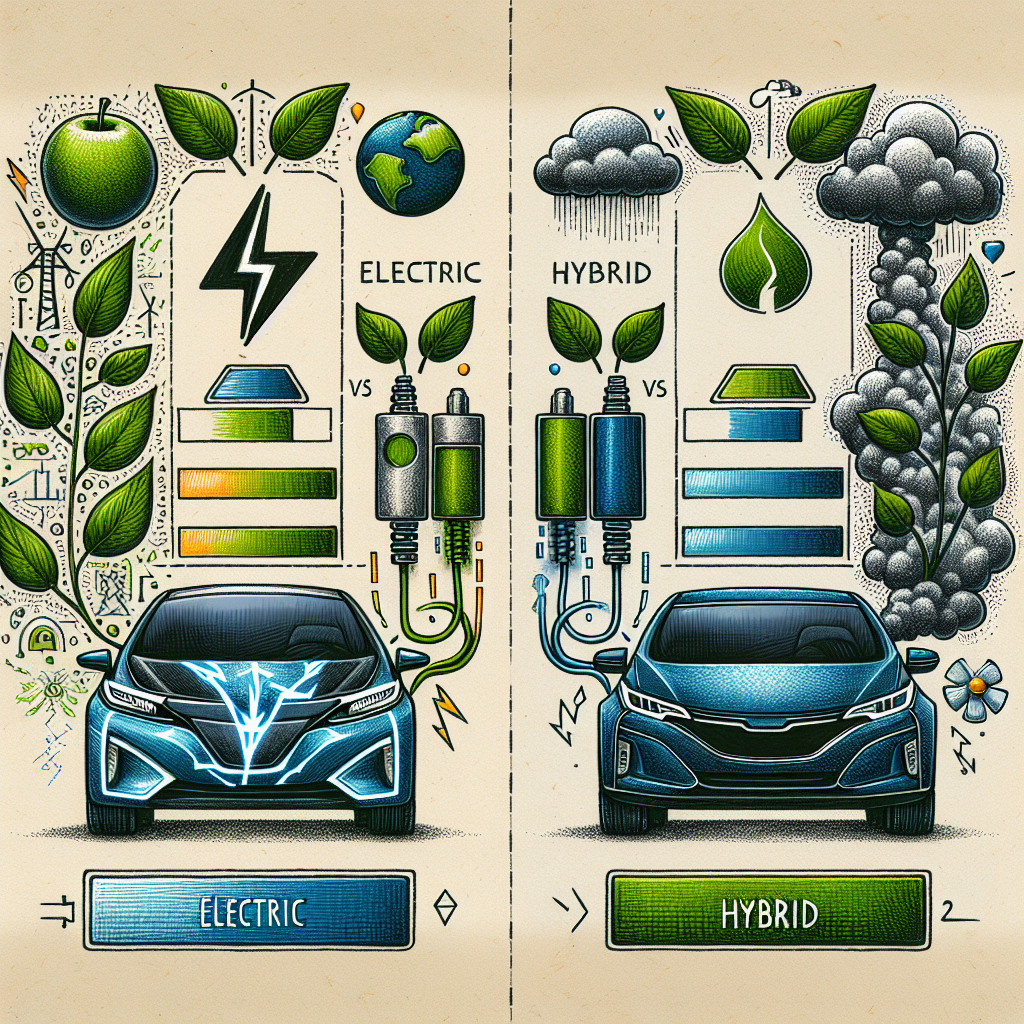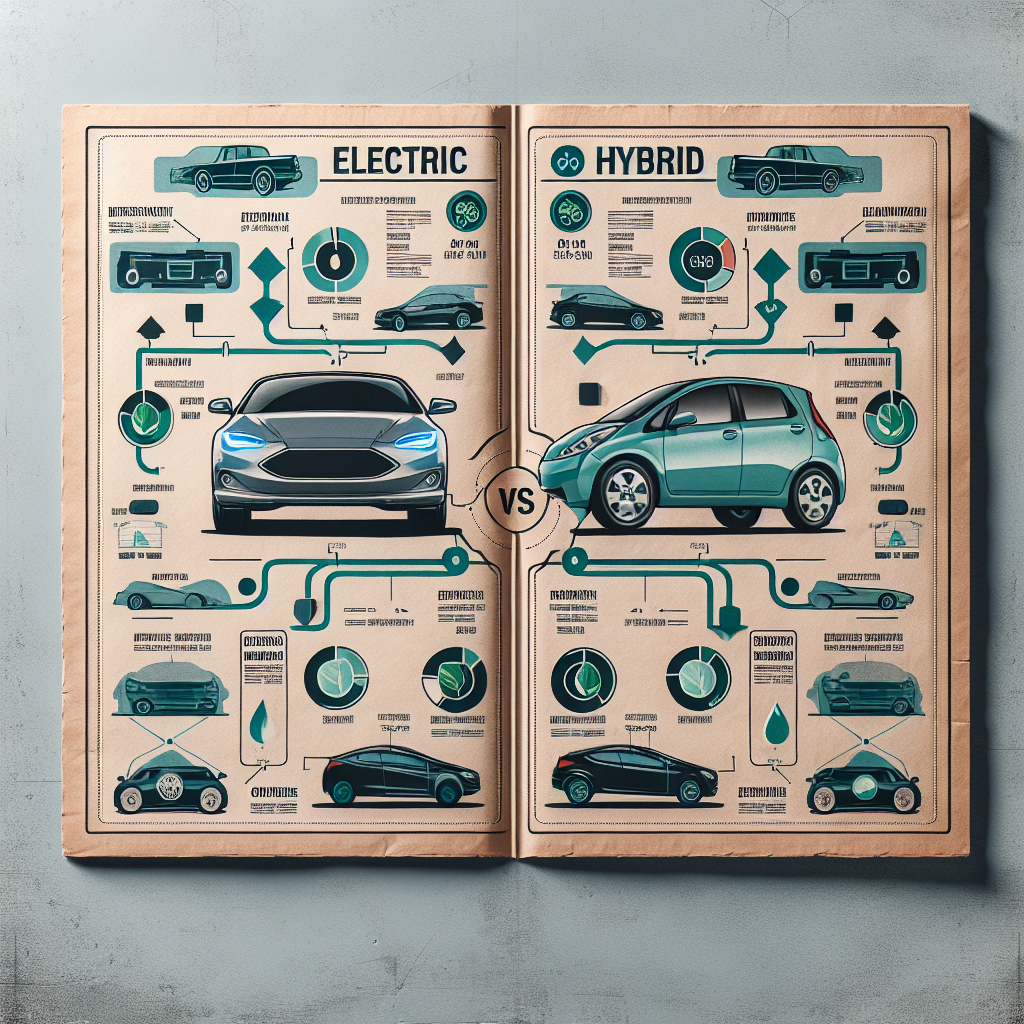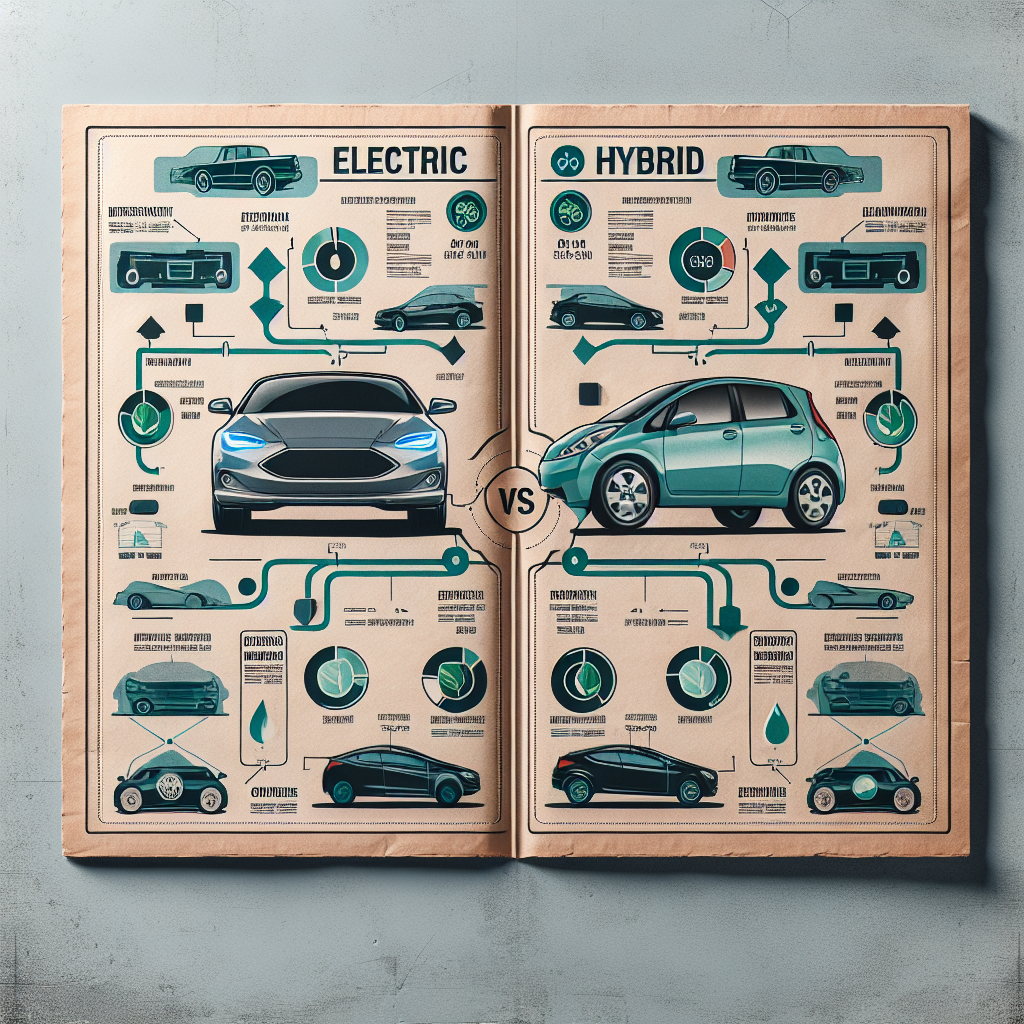Imagine a world where cars glided effortlessly, emitting zero emissions into the air we breathe. It’s a world where transportation and sustainability coexist in perfect harmony. In this article, we will take a closer look at the environmental impact of electric cars versus hybrid cars. By exploring the benefits and drawbacks of each technology, you will gain a better understanding of how these vehicles shape our planet’s future. Buckle up for a journey into the world of clean transportation!

Overview
In today’s world, where climate change and environmental concerns are becoming increasingly pressing issues, the choice of a vehicle can have a significant impact on the planet. Electric cars and hybrid cars have emerged as popular alternatives to traditional gasoline-powered vehicles, offering a more sustainable and eco-friendly mode of transportation. In this article, we will explore the environmental impact of electric cars and hybrid cars, comparing various aspects such as energy sources, greenhouse gas emissions, air pollution, energy efficiency, battery production and disposal, range and infrastructure, lifecycle analysis, government incentives and policies, as well as consumer perception and adoption.
Definition of Electric Cars
To begin our analysis, let’s first understand what electric cars are. Electric cars, also known as electric vehicles (EVs), are automobiles powered entirely by electricity stored in rechargeable batteries. Unlike conventional cars that rely on internal combustion engines fueled by gasoline or diesel, electric cars use an electric motor for propulsion. By eliminating the need for fossil fuels, electric cars offer a way to reduce greenhouse gas emissions and dependence on non-renewable energy sources.
Definition of Hybrid Cars
Hybrid cars, on the other hand, combine the benefits of both electric and conventional gasoline-powered vehicles. Hybrid cars feature an internal combustion engine as well as an electric motor and battery pack. They utilize a combination of these two power sources to optimize fuel efficiency and reduce emissions. Hybrid cars can run on gasoline, electricity, or a combination of both, depending on driving conditions and the car’s design.
Importance of Environmental Impact Analysis
Before delving into the specific comparisons between electric cars and hybrid cars, it is essential to emphasize the significance of conducting an environmental impact analysis. As consumers, we have a responsibility to make informed choices when it comes to our vehicle purchases. By examining the environmental implications of different types of vehicles, we can better understand their overall sustainability and make choices that align with our desire to reduce our carbon footprint and protect the planet.
Comparison of Energy Sources
Electricity Generation for Electric Cars
Electric cars are only as clean and sustainable as the electricity used to power them. Thus, it is crucial to examine the energy sources used for electricity generation. Ideally, electric cars should be charged using renewable energy sources such as solar, wind, or hydroelectric power. By utilizing clean energy, the environmental benefits of electric cars can be maximized, leading to lower greenhouse gas emissions and reduced reliance on fossil fuels.
Fuel Consumption for Hybrid Cars
Hybrid cars utilize both gasoline and electricity as their sources of energy. While they offer better fuel efficiency compared to conventional cars due to the electric motor assistance, their environmental impact is still influenced by the fuel consumption of their internal combustion engines. It is essential to consider the efficiency of the internal combustion engine and the type of fuel used to power hybrid cars to accurately assess their environmental performance.
Greenhouse Gas Emissions
Carbon Dioxide emissions from Electric Cars
One of the primary drivers of climate change is the emission of carbon dioxide (CO2) into the Earth’s atmosphere. Electric cars produce zero direct emissions of CO2 while driving since they rely on electricity stored in batteries. However, the emissions from electric cars are determined by the electricity generation process. If electric cars are charged using renewable energy sources, their CO2 emissions can be significantly lower compared to conventional gasoline-powered vehicles.
Carbon Dioxide emissions from Hybrid Cars
Hybrid cars emit CO2 emissions from two primary sources: the internal combustion engine and the electricity used for the electric motor. Since hybrid cars rely on both gasoline and electricity, their CO2 emissions are typically lower than those of conventional cars but higher than fully electric vehicles. However, the fuel efficiency of hybrid cars can vary depending on the driving conditions and the extent to which the electric motor is utilized.
Comparison of CO2 Emissions between Electric and Hybrid Cars
When comparing the CO2 emissions between electric cars and hybrid cars, it is crucial to consider the entire lifecycle, including the energy sources used for electricity generation and the fuel consumption of hybrid cars. In general, electric cars charged with renewable energy offer the lowest CO2 emissions among the two options. However, the emission levels can vary depending on the region and its energy mix. Hybrid cars may have higher emissions but still provide a significant reduction compared to conventional gasoline-powered vehicles.

Air Pollution
Emissions of Pollutants from Electric Cars
In addition to CO2 emissions and their contribution to climate change, vehicles also emit other pollutants that can have immediate local impacts on air quality. Electric cars produce zero tailpipe emissions of pollutants such as nitrogen oxides (NOx), particulate matter (PM), and volatile organic compounds (VOCs). This is in stark contrast to internal combustion engine vehicles, which can contribute to air pollution and have detrimental effects on human health.
Emissions of Pollutants from Hybrid Cars
Hybrid cars, although more fuel-efficient than conventional cars, still produce tailpipe emissions from their internal combustion engines. These emissions may include pollutants such as NOx, PM, and VOCs, depending on the type of fuel used. However, the presence of an electric motor in hybrid cars allows for reduced emissions during electric-only driving, especially in low-speed, stop-and-go traffic conditions common in urban areas.
Comparison of Air Pollution between Electric and Hybrid Cars
When comparing air pollution between electric cars and hybrid cars, electric cars clearly have the advantage. With zero tailpipe emissions, they contribute significantly less to air pollution and the associated health risks. Hybrid cars, while emitting fewer pollutants than conventional cars, still have the potential to contribute to air pollution when operating solely on their internal combustion engines.
Energy Efficiency
Electric Cars’ Energy Consumption
Energy efficiency is an essential aspect in evaluating the environmental impact of vehicles. Electric cars are generally more energy-efficient compared to hybrid and conventional gasoline-powered cars. This efficiency is due to the direct conversion of electrical energy into mechanical energy without the energy losses associated with internal combustion engines. The energy consumption of electric cars can vary depending on factors such as driving conditions, vehicle weight, and battery technology.
Hybrid Cars’ Energy Consumption
Hybrid cars aim to optimize energy consumption by utilizing a combination of an internal combustion engine and an electric motor. The energy consumption of hybrid cars is influenced by various factors such as the efficiency of the internal combustion engine, regenerative braking, and the driving modes (electric-only, hybrid, or gasoline-only). Overall, hybrid cars tend to be more energy-efficient than conventional gasoline-powered vehicles but may not match the energy efficiency of electric cars.
Comparison of Energy Efficiency between Electric and Hybrid Cars
When comparing the energy efficiency between electric cars and hybrid cars, electric cars often come out on top. The direct conversion of electrical energy into mechanical energy allows electric cars to achieve higher energy efficiency. However, hybrid cars offer more flexibility and adaptability with their ability to switch between gasoline and electric power sources, allowing them to optimize energy consumption in certain driving conditions.
Battery Production and Disposal
Environmental Impact of Electric Car Batteries
Electric car batteries, while essential for their operation, can have significant environmental implications. The production of batteries involves the extraction, processing, and transportation of raw materials, which can contribute to environmental degradation. Additionally, battery disposal presents a challenge, as batteries contain toxic and hazardous materials that require proper handling and recycling to avoid negative impacts on the environment.
Environmental Impact of Hybrid Car Batteries
Hybrid car batteries, although smaller in size compared to electric car batteries, still pose environmental challenges. The production and disposal processes for hybrid car batteries entail similar environmental concerns, including the extraction of raw materials and the management of hazardous waste. However, the overall environmental impact of hybrid car batteries may be lower due to their smaller size and reduced reliance on battery power alone.
Comparison of Battery Production and Disposal Impact
When comparing the environmental impact of battery production and disposal between electric cars and hybrid cars, it is important to consider factors such as battery size, technology, and recycling capabilities. Generally, electric car batteries have a larger environmental footprint, given their larger size and greater reliance on battery power. However, ongoing advancements in battery technology and recycling practices are continuously reducing the environmental impact of both electric and hybrid car batteries.
Range and Infrastructure
Electric Cars’ Range and Charging Infrastructure
Range anxiety, or the fear of running out of battery power, has been a significant concern for electric car owners. However, with advancements in battery technology, electric cars now offer longer ranges, ranging from approximately 200 to over 300 miles on a single charge. Additionally, charging infrastructure has been expanding rapidly, with more public charging stations and home charging options becoming readily available.
Hybrid Cars’ Range and Refueling Infrastructure
Hybrid cars do not suffer from range anxiety like electric cars since they have the backup of a conventional fuel tank. They can be refueled at gas stations, providing extended range capabilities. However, they still rely on an adequate refueling infrastructure, which is generally well-established for gasoline-powered vehicles.
Comparison of Range and Infrastructure for Electric and Hybrid Cars
When comparing the range and infrastructure for electric cars and hybrid cars, there are trade-offs to consider. Electric cars offer zero-emission driving and longer ranges with the caveat of requiring charging infrastructure. Hybrid cars provide the convenience of extended range without the need for specialized charging stations. The choice between the two depends on individual needs, including the typical daily driving distance, access to charging infrastructure, and the willingness to rely on gasoline for longer trips.
Lifecycle Analysis
Environmental Impact of Electric Cars throughout Their Lifecycle
To thoroughly assess the environmental impact of electric cars, it is essential to consider their entire lifecycle, from raw material extraction to production, operation, and eventual disposal. Electric cars have a lower environmental impact during operation due to their zero tailpipe emissions. However, the environmental impact of battery production and disposal, as well as the energy sources used for electricity generation, must be taken into account to evaluate their overall sustainability.
Environmental Impact of Hybrid Cars throughout Their Lifecycle
Similar to electric cars, hybrid cars’ environmental impact should be evaluated throughout their entire lifecycle. While their emissions during operation are lower compared to conventional cars, the production and disposal processes, as well as the fuel consumption of their internal combustion engines, contribute to their overall environmental footprint.
Comparison of Lifecycle Environmental Impact
When comparing the lifecycle environmental impact between electric cars and hybrid cars, both have their unique challenges and benefits. Electric cars excel in reducing emissions during operation but face concerns regarding battery production and disposal, as well as the energy mix used for electricity generation. Hybrid cars provide a more balanced approach, with lower emissions compared to conventional cars, but still have challenges related to fuel consumption and the environmental impact of battery production.
Government Incentives and Policies
Government Incentives for Electric Cars
To promote the adoption of electric cars and support the transition to a more sustainable transportation sector, many governments around the world offer various incentives. These incentives can include tax credits, purchase rebates, grants, and subsidies, aiming to make electric cars more affordable and attractive to consumers. Additionally, governments may invest in charging infrastructure development and support research and development for battery technology advancements.
Government Incentives for Hybrid Cars
Similarly, governments also provide incentives and support for hybrid cars, although to a lesser extent compared to electric cars. These incentives may include tax incentives, lower registration fees, and other financial incentives that aim to encourage consumers to choose hybrid cars over conventional gasoline-powered vehicles. However, the incentives for hybrid cars may vary significantly between regions and countries.
Comparison of Government Policies
When comparing government incentives and policies for electric cars and hybrid cars, it is clear that electric cars receive more significant support due to their potentially greater environmental benefits. The focus on promoting electric cars is driven by the desire to reduce greenhouse gas emissions and accelerate the transition to a more sustainable energy future. However, as hybrid technology advances and becomes more efficient, governments may reevaluate their policies and offer more substantial incentives to hybrid car buyers.
Consumer Perception and Adoption
Consumer Attitudes towards Electric Cars
Consumer attitudes towards electric cars have been evolving as electric vehicles become more prevalent in the market. Initially, concerns such as range anxiety, limited charging infrastructure, and high upfront costs hindered consumer adoption. However, as these challenges are gradually being addressed, more consumers are recognizing the benefits of electric cars, including their environmental friendliness, lower operating costs, and the potential for energy independence. Positive consumer attitudes towards electric cars are crucial in driving their widespread adoption and reducing the overall environmental impact of transportation.
Consumer Attitudes towards Hybrid Cars
Hybrid cars have been on the market for a longer time than electric cars and have gained moderate consumer acceptance. Many consumers appreciate the fuel efficiency and reduced emissions of hybrid cars while still having the option of using gasoline for longer trips. However, some consumers may still perceive hybrid cars as a compromise between fully electric cars and conventional vehicles, which could impact their adoption.
Comparison of Consumer Perception and Adoption
When comparing consumer perception and adoption of electric cars and hybrid cars, it is evident that electric cars have gained more attention and interest in recent years. This can be attributed to the growing awareness of climate change and environmental concerns, as well as the continuous advancements in electric vehicle technology. However, hybrid cars still have a place in the market, particularly for consumers who require extended range capabilities and do not have access to reliable charging infrastructure.
In conclusion, electric cars and hybrid cars both offer significant environmental advantages compared to conventional gasoline-powered vehicles. Electric cars excel in terms of zero tailpipe emissions, energy efficiency, and potential for renewable energy use. Hybrid cars provide a more balanced approach with extended range capabilities and improved fuel efficiency. Ultimately, the choice between electric and hybrid cars depends on individual needs, including driving patterns, access to charging infrastructure, and environmental priorities. By considering the comprehensive environmental impact analysis outlined in this article, you can make an informed decision that aligns with your desire to minimize your carbon footprint and contribute to a more sustainable future for our planet.

